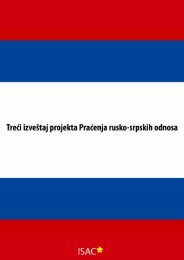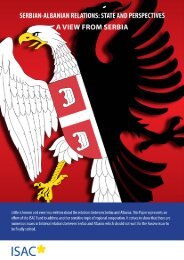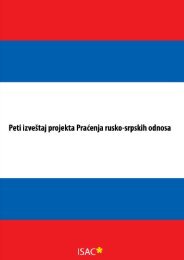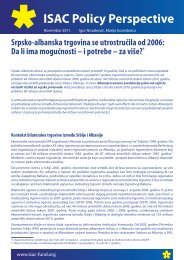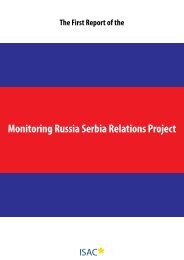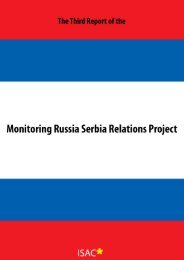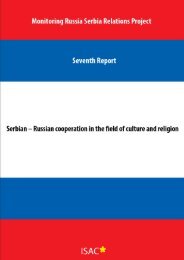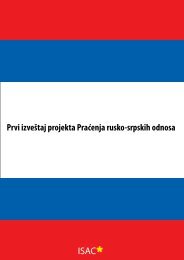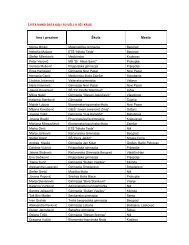the process of security sector reform - ISAC Fund
the process of security sector reform - ISAC Fund
the process of security sector reform - ISAC Fund
You also want an ePaper? Increase the reach of your titles
YUMPU automatically turns print PDFs into web optimized ePapers that Google loves.
Narcís Serra TRANSITION TO DEMOCRACY AND MILITARY REFORM: POSSIBLE FRAMEWORK<br />
Narcís Serra TRANSITION TO DEMOCRACY AND MILITARY REFORM: POSSIBLE FRAMEWORK<br />
The third question that must be analysed is what usually happens when power is<br />
taken from armies. The military usually decide on firm entrenchment in military<br />
autonomy. They seek to increase control <strong>of</strong> <strong>the</strong>ir organisation and combat<br />
any attempts at external control by, in certain cases, reinforcing <strong>the</strong> elements<br />
that distinguish <strong>the</strong>m from <strong>the</strong> rest <strong>of</strong> society. Although <strong>the</strong>re will always be<br />
a certain measure <strong>of</strong> autonomy, even in consolidated democracies that have<br />
been functioning as such for a very long time, it becomes a question <strong>of</strong> <strong>the</strong><br />
levels <strong>of</strong> power withdrawal decided by <strong>the</strong> military <strong>the</strong>mselves, not by political<br />
authorities.<br />
From this position <strong>of</strong> autonomy <strong>the</strong>y can maintain different attitudes. Military<br />
<strong>reform</strong> is nothing but a <strong>process</strong> that forces <strong>the</strong> military to move gradually towards<br />
positions <strong>of</strong> greater democratic normalisation. In my opinion, from <strong>the</strong> Spanish<br />
experience and that <strong>of</strong> <strong>the</strong> two o<strong>the</strong>r sou<strong>the</strong>rn European countries that went<br />
through such a <strong>process</strong> at more or less similar times, we see various positions <strong>of</strong><br />
military intervention in <strong>the</strong> political domain. From greater to lesser autonomy,<br />
<strong>the</strong>y are <strong>the</strong> following:<br />
1. Control <strong>of</strong> political power. In such a scenario, a military <strong>of</strong>ficial is usually<br />
<strong>the</strong> President or Head <strong>of</strong> State. There are collective decision-making<br />
bodies which are military in nature, many political posts which<br />
are occupied by military <strong>of</strong>ficers and <strong>the</strong> domestic <strong>security</strong> apparatus<br />
is made up <strong>of</strong> military <strong>of</strong>ficials and under military control, including information<br />
systems and Intelligence.<br />
2. The military as guardians <strong>of</strong> <strong>the</strong> national essence. The Armed Forces<br />
consider <strong>the</strong>mselves above politics and parties, not just a <strong>sector</strong> <strong>of</strong><br />
<strong>the</strong> administration <strong>of</strong> <strong>the</strong> state. They thus maintain <strong>the</strong> threat <strong>of</strong> acting<br />
when as a collective body <strong>the</strong>y consider that <strong>the</strong>ir mission so demands,<br />
instead <strong>of</strong> acting as instruments <strong>of</strong> government. Something <strong>of</strong> that nature<br />
occurred in Spain in <strong>the</strong> course <strong>of</strong> <strong>the</strong> constitutional debate. Even <strong>the</strong><br />
United States have experienced this attitude because General McArthur<br />
placed himself in such authority when he denounced “<strong>the</strong> dangerous<br />
concept according to which <strong>the</strong> members <strong>of</strong> our armed forces owe loyalty,<br />
first and foremost to those who temporarily exert <strong>the</strong>ir authority in <strong>the</strong><br />
executive <strong>sector</strong> <strong>of</strong> <strong>the</strong> government instead <strong>of</strong> owing it to <strong>the</strong> country<br />
and its Constitution, which <strong>the</strong>y have sworn to defend”.<br />
3. The military as <strong>the</strong> force that conditions government policy, by placing<br />
limits on <strong>reform</strong>s and vetoing certain lines <strong>of</strong> action. In such cases <strong>the</strong><br />
military usually maintain full autonomy and levels <strong>of</strong> direct intervention<br />
in political questions and questions pertaining to <strong>the</strong> running <strong>of</strong> <strong>the</strong><br />
Administration.<br />
4. Defenders <strong>of</strong> <strong>the</strong>ir organisational and operational autonomy. It is a<br />
situation that usually arises when <strong>the</strong> military are losing or have already<br />
lost <strong>the</strong> possibility <strong>of</strong> political and administrative intervention. The usual<br />
response is to prevent <strong>the</strong> civil authorities from intervening in those<br />
fields <strong>the</strong>y consider to be <strong>the</strong> exclusive preserve <strong>of</strong> military authorities.<br />
5. Formal, though partial, acceptance <strong>of</strong> civil supremacy. Though no declarations<br />
are made against this, and though <strong>the</strong>y don’t act against <strong>the</strong> laws<br />
that authorise civil supremacy, certain orders are disobeyed, and actions<br />
are also taken on <strong>the</strong>ir own initiative, that have been nei<strong>the</strong>r ordered nor<br />
desired by civil authorities. An example is <strong>the</strong> behaviour <strong>of</strong> <strong>the</strong> military<br />
high command at <strong>the</strong> beginning <strong>of</strong> <strong>the</strong> Spanish political transition, when<br />
only minimum sentences were handed down for acts <strong>of</strong> insubordination<br />
against <strong>the</strong> democratic government.<br />
6. Maintenance <strong>of</strong> ideological control by <strong>the</strong> military. In general, organisational<br />
and operational controls are accepted, but control is maintained<br />
over <strong>the</strong> pr<strong>of</strong>essional definition, over <strong>the</strong> values to be cultivated, with<br />
control, in particular, over military education and access to <strong>the</strong> military<br />
career.<br />
7. Democratic civil control <strong>of</strong> <strong>the</strong> Armed Forces. In this situation, executive<br />
power defines military policy, <strong>the</strong> Minster directs and exerts control and<br />
direction <strong>of</strong> <strong>the</strong> Armed Forces, legislative power controls executive<br />
power and <strong>the</strong> military as a whole, and military justice is integrated<br />
within judicial power. In democracy that is unique and binding.<br />
It must be emphasised that in real situations, <strong>the</strong>re is no defined limit between<br />
transition and consolidation, so that several <strong>of</strong> <strong>the</strong> situations described might<br />
have to be dealt with in this second phase, especially from point four onwards.<br />
On <strong>the</strong> o<strong>the</strong>r hand, to control <strong>the</strong> <strong>process</strong> <strong>the</strong> overriding issue is not so much a<br />
30 31



